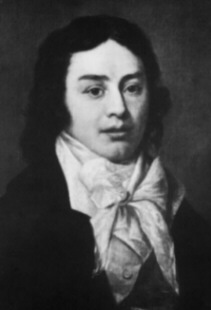|

Coleridge
|
In sharp contrast to
the more prosaic, less self-conscious
Alpha-thinking,
Beta-thinking is "thinking about thinking,"
and in ordinary philosophical terminology is often called "reflection."
Barfield quotes approvingly Coleridge's description
of "transcendental thinking"--the British Romantic's
own term for Beta-thinking:
There is
a philosophic (and inasmuch as it is actualized by an effort of
freedom, an artificial) consciousness which lies beneath or (as it were)
behind the spontaneous consciousness natural to all reflecting beings.
As the elder Romans distinguished their Northern provinces into Cis-Alpine
and Trans-Alpine, so may we divide all the objects of human knowledge into
those on this side, and those on the other side of the spontaneous consciousness;
citra
et trans conscientiam communem. The latter is exclusively the domain
of pure philosophy, which is therefore properly entitled transcendental,
in order to discriminate it at once, both from mere reflection and representation,
on the one hand, and on the other from those flights of lawless speculation
which, abandoned by all distinct consciousness, because transgressing the
bounds and purposes of our intellectual faculties, are justly condemned
as transcendent. (WCT 15-16)
Under the sway of Beta-thinking,
it is "invariably assumed that a very large part of . . . the represented
is to be found 'within' ourselves" (SA 41). But this common sense
is in fact the result of the idolatry characteristic
of the
consciousness soul.
| See in particular
Saving
the Appearances, Chap. III and What Coleridge Thought, Chap.
1. |
|
